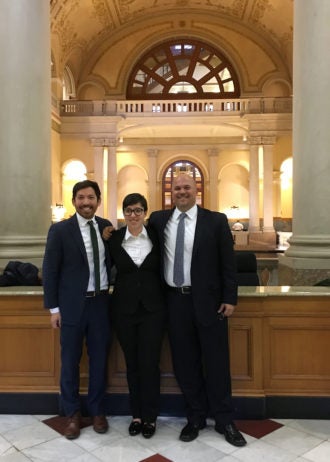3L presents ‘Catalyst theory’ argument that may change the standard for determining attorney’s fees in wage lawsuits in Massachusetts

The Harvard Legal Aid Bureau (HLAB) has received a major win in a case that may change the standard for determining attorney’s fees in wage lawsuits in Massachusetts.
Liz Soltan ’19 and Kenneth Parreno ’19, third-year law students working for HLAB, and Clinical Instructor Patricio Rossi represented two former employees of a Boston dry cleaners who said they were cheated out of $28,000 in wages and overtime pay and sought attorney’s fees stemming from the litigation.
The case, Ferman v. Sturgis Cleaners, Inc., was argued before the Massachusetts Supreme Judicial Court on Dec. 4, 2018.
In December, Soltan represented the former employees before the SJC under Massachusetts Supreme Judicial Court Rule 3:03, which allows student attorneys to serve as counsel to indigent clients across the state.
The issue before the court centered around the Wage Act (Mass. General Laws ch. 149 §§ 148, 150) which awards costs and fees when an employee “prevails” in an action arising under the statute. The parties in this case had settled in 2016, but could not agree on attorney’s fees. They decided to let the court resolve the issue. The SJC was faced with the question of whether an employee “prevails” when the parties settle the litigation.
Immediately after returning from break this past summer, Elizabeth Soltan ’19, Kenneth Parreno ’19, and Josephine Herman ’20 began work on the workers’ appeal brief. Under a tight timeline, they crafted a persuasive argument that the “catalyst theory” is the proper test in Massachusetts to determine prevailing party status. According to HLAB, the catalyst theory involves a two-part test. For a plaintiff to prevail, his/her lawsuit must be “a necessary and important factor in achieving the [sought-after] relief” and cannot be “frivolous, unreasonable, or groundless.” Nearly ten groups, including the American Civil Liberties Union of Massachusetts, the Massachusetts Law Reform Institute, and the Immigrant Worker Center Collaborative, filed amicus briefs in support of the plaintiff-appellees.
On December 4, 2018, Soltan argued before the Massachusetts Supreme Judicial Court. She spent an intense few weeks preparing and mooting her argument. All of the practice paid off as Soltan delivered an incredibly poised argument to the SJC justices.
Defendants argued that the federal standard, which requires judicial approval of a private settlement in order for there to be a clear prevailing party, should apply.
On Tuesday, Feb. 19, the Massachusetts Supreme Judicial Court agreed with HLAB, ruling that “an employee suing an employer for unpaid wages can recover attorney’s fees when winning a ‘favorable settlement,’ even when a court does not sign off on the deal.”
In an interview with Law360, which published a piece about the SJC’s ruling, Soltan said as she answered the justices’ questions during her presentation, she began to believe that the case might turn in her clients’ favor.
“There was a certain point where I sensed they were trying to flush out how it would work and how settled the body of precedent was,” Soltan said. “That was a moment where I felt like, ‘OK, maybe they are figuring out how to write a favorable opinion.’ I was cautiously optimistic and really excited.”
In January, Soltan and Rossi wrote about the critical role the HLAB team played in this case, helping two immigrant women of color obtain relief for wage theft from their employer.
“Wage theft is such an epidemic in Massachusetts, especially among low-income and immigrant workers. This is the kind of ruling we needed for access to justice … I am hoping it’ll mean more lawyers are going to feel secure in taking these cases.”
– Liz Soltan ’19
“The average American worker earns $7,500 less than they should according to a 2017 analysis from Glassdoor,” they wrote. “Low-wage immigrant workers, particularly immigrant women, are disproportionately susceptible to workplace violations such as underpayment. Litigation to combat illegal practices such as wage theft costs more than these workers can afford. … [S]tudents have been fighting to ensure low-wage workers like the women in this case have access to attorney’s fees.”
Students from HLAB, the oldest student-run legal aid organization in the country, first got involved with the case more than five years ago.
Kellie MacDonald ’15 originally filed the case in 2014 in Suffolk Superior Court. The case settled in 2016 for approximately $20,000. Khyrstyn McGarry ’17 and Michele Hall ’17 filed a petition for attorney’s fees, arguing that, pursuant to the “Catalyst Theory,” the workers were the prevailing party. In the spring of 2017, the Superior Court awarded HLAB approximately $16,000 in attorney’s fees. The employers appealed the decision and HLAB students Jag Singh ’18 and Lark Turner ’18 filed an application with the Supreme Judicial Court for Direct Appellate Review, which was eventually granted.
Related coverage
Harvard Law Student Gets Landmark Win At Mass. Top Court (Law 360)
Atty Fee Ruling May Grease Skids For Wage Case Settlements (Law 360)
Mass. Top Court Sets Standard For Atty Fees In Wage Suits (Law 360)